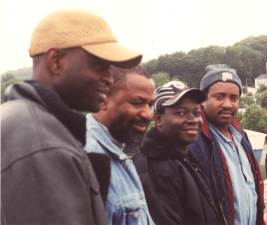Bhundu Boys
Home Search Leave Feedback Contact Us
|
Bhundu Boys Home Search Leave Feedback Contact Us
|
|
|
Despite current problems at home, the Bhundu Boys very name reflects the pride they have in their country, the original Bhundu (bush) boys being the bush guerrillas who fought in the bloody war of independence in the 70s. We are as old as our country is how Rise Kagona, founder of the group, puts it. The band arose from the seeds of local groups like The Wild Dragons and the Black Superstars, learning their craft on Harare’s nightclub circuit. In a political atmosphere where homegrown African music was still considered revolutionary, they performed with borrowed gear, originally covering western pop. The band were one of the first to attack the UK market and in 1987 went top of the indy charts with the Zimbabwean recorded Shabini and Sticks of Fire albums, now re-released as a deluxe double-album called The Shed Sessions (released 2001) With support slots for Madonna at Wembley Stadium and Eric Clapton in Africa; guest appearances with Mark Knopfler, Youssou N’Dour and Don Williams; and raved about by John Peel, Andy Kershaw and many others, their reputation was second to none, until serial tragedy struck the band, taking its toll on their creative output and continual gigging. The Bhundu boys last toured Ireland in 2002 when they played an 8 date tour including Feile an Phobail in West Belfast. 
 Kuda,
Washington, Rise & Kenny, The Bhundu Boys checking out the fish at Union Hall
Co Cork 2002
Kuda,
Washington, Rise & Kenny, The Bhundu Boys checking out the fish at Union Hall
Co Cork 2002
Could not fail to bring life to the most static of feet - John Peel Intoxicating slices of sun - an addictive celebratory high that needs no translation - NME The giddying tripping guitar of the African township - Q Magazine Stretches cross-cultural comprehension to breaking point - The Scotsman See Also:
|
|